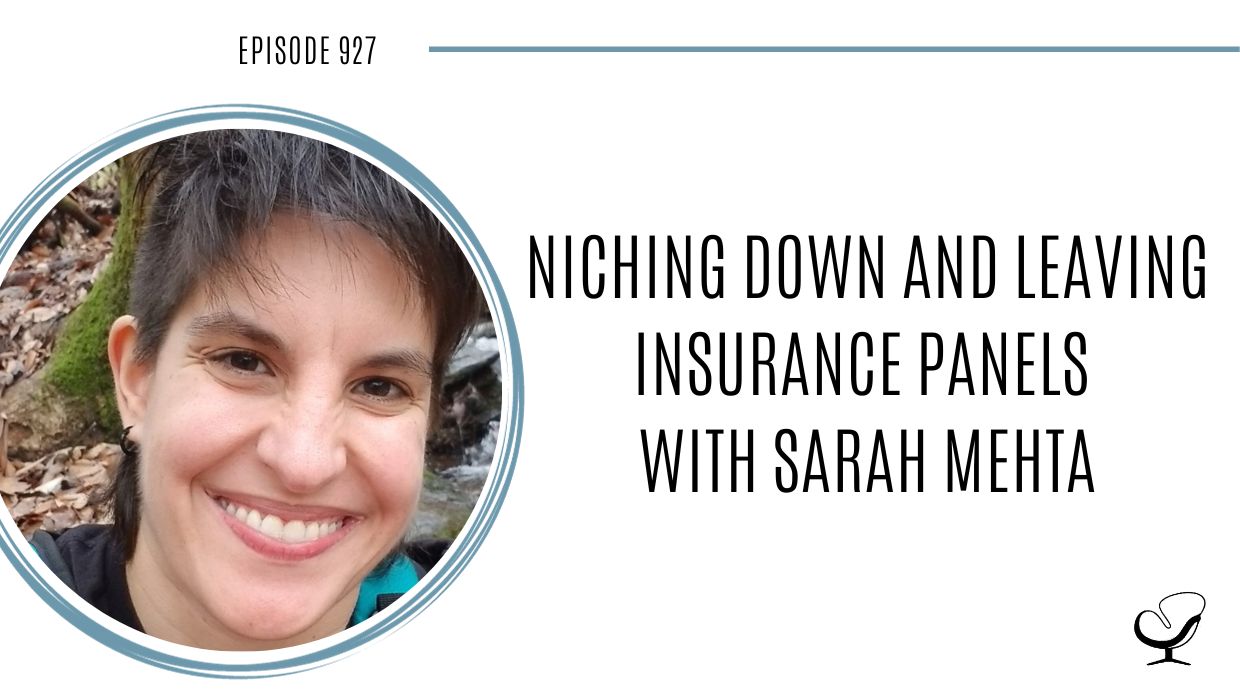Podcast: Play in new window | Download | Embed
Is it possible to move clients over from insurance to private pay? How does working with the right niche reduce burnout? Do you have the different types of networking groups that best suit and support you?
In this podcast episode, Andrew Burdette speaks about niching down and leaving insurance panels with Sarah Mehta.
Podcast Sponsor: Therapy Notes

As a therapist, I can tell you from experience that having the right EHR is an absolute lifeline. I recommend using TherapyNotes. They make billing, scheduling, notetaking, telehealth, and E-prescribe incredibly easy. Best of all, they offer live telephone support that’s available 7 days a week.
You don’t have to take my word for it – Do your own research and see for yourself – TherapyNotes is the #1 highest-rated EHR system available today, with 4.9 out of 5 stars on Trustpilot.com and on Google.
All you have to do is click the link below, or type promo code JOE on their website www.therapynotes.com, and receive a special 2-month trial, absolutely free.
If you’re coming from another EHR, TherapyNotes will import your demographic data quickly and easily at no cost, so you can get started right away.
Trust me, don’t waste any more of your time, and try TherapyNotes.
Meet Sarah Mehta

Sarah Mehta (she/they) is a Licensed Clinical Mental Health Counselor (LCMHC) and a Licensed Clinical Addictions Specialist (LCAS) in North Carolina. She received her Master’s degree in Clinical Mental Health Counseling from Appalachian State University in 2016, and she has been practising in the counselling field since 2017.
Sarah has experience across multiple settings, including community mental health and PHP/IOP. Sarah has owned her private practice, Mountain Soul Counseling, PLLC, since November 2021. She specializes in adult ADHD, adult children of emotionally immature parents, and relationship trauma, particularly with folx that identify as BIPOC, queer, or hold other marginalized identities.
Visit Mountain Soul Counseling and connect on LinkedIn and Psychology Today.
In this Podcast
- Transitioning out of agency work
- Breaking up with insurance companies
- Working with the right niche reduces burnout
- Network for work and support
Transitioning out of agency work
Sarah knew that there was a career-change happening, and wanted to be prepared to get into a place to focus on starting a private practice without stressing too much. At the time, Sarah was still completing agency work and seeing clients, so every few days or weeks they’d do one more thing toward becoming their own therapist to see clients independently.
At least for me, looking back on it, that’s probably what helped my nervous system get through a lot of that [which was] not doing it all at once because … doing that and agency work at the same time was pretty overwhelming. (Sarah Mehta)
Sarah got her PLLC, got the paperwork done with the state, and signed up for insurance while getting her profile and website content set up. These were the biggest pieces they took on to set up her therapy practice while slowly transitioning out of doing agency work at the same time. For others, if she could do this over again, Sarah recommends trying a four-day workweek to prepare for the transition, and to lean on your faith to give yourself some extra strength and peace during this time of uncertainty and stress.
Breaking up with insurance companies
Many therapists begin their private practice journey taking therapy because it provides them with a resource to meet clients through insurance panels. There is an appreciation for therapy as a tool to help clients receive access to care from qualified therapists. However, after some time, the effort that it takes to take insurance – especially if you are doing all the admin yourself while seeing clients – can turn it into more of a hassle than a benefit.
A lot of [therapists feel] … rage, is probably a great way to put the emotion many of us feel that do take insurance about how cumbersome and unnecessarily and deliberately dysfunctional the system really is around insurance. (Andrew Burdette)
For Sarah at the start of their private practice journey, she used to take insurance to see clients. She opened in November 2021 and started to move off of insurance panels in December 2022. In terms of clients, Sarah was able to keep a handful of folks after switching to private pay, although most did decide to go elsewhere. What Sarah recommends to other therapists is to send an email with any update in policy with a two or three-month advance notice to allow clients to read it over and bring the document into session for any further questions.
One thing I probably would’ve done is to do an email and give folks that kind of chance to process on their own and then bring that into session. That’s what I’ve been doing this year as I am working towards changing several policies, changing my schedule, and raising my rates, and that has actually been really effective. (Sarah Mehta)
When you work with the right niche, you often struggle with burnout a lot less. You might feel burned out due to other reasons, but working with the right clients for you is a necessary situation that you have to create for yourself. You do your best therapy and you can really help people transform their lives when you are working in the right population of your community.
This idea of wanting to go into my week and wake up and look at my calendar and feel excited about who was on my calendar for that day … For me, that’s what I try to keep in mind as I think about my niche and who I work well with. (Sarah Mehta)
Create a strong alignment and match within your therapeutic relationship between you and your client so that you both feel supported and excited about the work that lies before you so that you can trust one another in the process.
Network for work and support
Sarah recommends that you find referral network partners that are working in the adjacent niches to yours so that you can both refer to one another and maintain a relatively steady stream of referral clients. Additionally, Sarah also recommends that you find a network system of like-minded, proactive and welcoming professionals that you can work alongside and learn from. Therapy can be a lonely line of work, so finding a group of therapists that you get along with and can professionally befriend can do wonders for your fiscal success and mental health. Working with a network of therapists to learn from can also give you advice and support when you want to raise your rates. Be sure that you have a space like this so that you can learn and be supported in your choices.
At the end of the day, what I’ve come to understand about my fee is that it is not representative of my worth as a person, it’s not necessarily representative or all encompassing of my clinical work or education; it is what I need to get my needs met. (Sarah Mehta)
Working with the right niche reduces burnout
Sponsors Mentioned in this episode:
- Trust me, don’t waste any more of your time, and try TherapyNotes.
- Visit sparrowsearchservices.com and mention JOE to receive a $500 discount!
Useful links mentioned in this episode:
- Visit Mountain Soul Counseling and connect on LinkedIn and Psychology Today.
- Apply to work with Andrew or one of our other consultants!
- Email Joe at [email protected] to suggest guests for the show
Check out these additional resources:
Clinical Directing in a Group Practice with Alli Ramirez | POP 926
Events – click on the event’s dropdown
Sign up to join the free webinars and events here
Practice of the Practice Podcast Network
Free resources to help you start, grow, and scale
Apply to work with us — a decision-making matrix for your next steps
Meet Joe Sanok

Joe Sanok helps counselors to create thriving practices that are the envy of other counselors. He has helped counselors to grow their businesses by 50-500% and is proud of all the private practice owners who are growing their income, influence, and impact on the world. Click here to explore consulting with Joe.
Thanks For Listening!
Feel free to leave a comment below or share the social media below!

